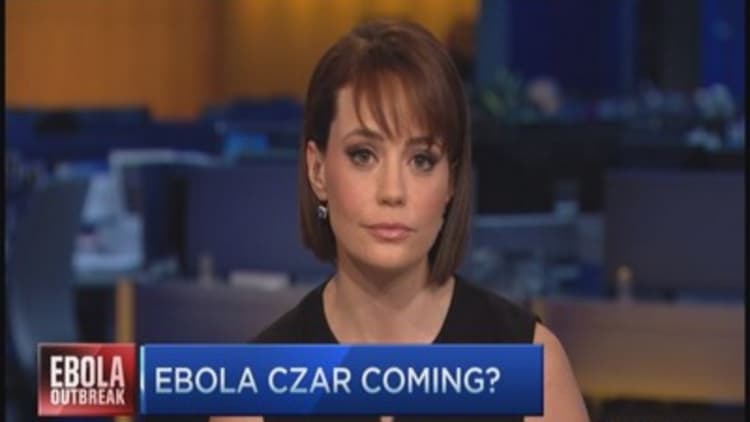Amid a grilling about what went wrong in Dallas, calls for travel bans from West Africa (including restrictions for dogs), and fears that Ebola could become airborne, one statement may have been buried in Thursday's congressional hearing on the U.S. Ebola response.
Luciana Borio, assistant commissioner for counterterrorism policy at the U.S. Food and Drug Administration, didn't receive the same volume of questioning or level of scrutiny as Tom Frieden, director of the Centers for Disease Control and Prevention (and the public face of the U.S.' response to Ebola).
But in her testimony, she said something we may not have known before—and that wasn't included in her published remarks: "Every Ebola patient in the U.S. has been treated with at least one investigational product."
Now, whether this definitely means each Ebola patient under treatment has received a drug is likely, but unclear— "investigational products" could potentially mean other things, and the FDA won't clarify. But if she was referring to drugs, that means three patients—an unnamed person being treated at Emory University Hospital, who was flown back from West Africa, and Dallas nurses Nina Pham and Amber Vinson—are receiving therapies that hadn't yet been disclosed.
Read MoreNo Ebola epidemic in US without 'mutation:' CDC
We know that Kent Brantly and Nancy Writebol, the first Americans to be flown back from West Africa for treatment in the U.S., received the experimental drug ZMapp, from Mapp Biopharma. And it eventually emerged that Rick Sacra, who was treated in Nebraska, got Tekmira's experimental medicine, TKM-Ebola. All recovered.
We also know that Thomas Eric Duncan, the Liberian man who was the first person to be diagnosed with Ebola on U.S. soil, and Ashoka Mukpo, the NBC cameraman flown back to Nebraska for treatment, received Chimerix's experimental antiviral drug brincidofovir. Mukpo is said to be recovering; Duncan passed away Oct. 8.
Read MoreWhy we haven't cured Ebola yet
It's important to remember that none of these drugs were used in controlled clinical trial settings for Ebola, and it's difficult to take anything away about their efficacy, or lack thereof, from these circumstances. Each patient had a unique experience, also received supportive care and in some cases, received donated blood from Ebola survivors.
So too, will the experiences of the three other patients, whose treatment hasn't been disclosed, be unique.

The patient being treated at Emory, who was admitted in early September and about whom few details are known, released a statement Wednesday.
"Given the national focus on Ebola, particularly with the diagnosis in two health-care workers, I want to share the news that I am recovering from this disease, and that I anticipate being discharged very soon, free from the Ebola virus and able to return safely to my family and to my community," the anonymous patient said. "As a result of the virus, my condition worsened and I became critically ill soon after I arrived at Emory. Through rigorous medical treatment, skillful nursing and the full support of a health-care team, I am well on the way to a full recovery."
Read More
Vinson, who was diagnosed Wednesday, was transferred from Dallas to Emory later the same day for treatment. If she's receiving an experimental drug, the treatment decision was made swiftly. Pham, who was diagnosed Sunday, was moved Thursday to a treatment center at the National Institutes of Health.
Anthony Fauci, director of the National Institute of Allergy and Infectious Diseases, said the NIH can't discuss Pham's treatment because of privacy concerns, though he noted she did receive a transfusion of plasma from Brantly.
"At this point in time, we are still working with the patient about what we can say publicly," Fauci said in a news conference Friday. "In terms of other, quote, experimental drugs, we will have to check with her whether she wants this to be known publicly because of patient confidentiality."
Fauci said that in general, it would be possible for patients to receive more than one experimental therapy, "but we've got to be careful, because these are all experimental drugs," and none have been proven to be effective. Safety is also a key concern in considering combining therapies, he said.
CDC's Frieden has said treatment decisions, including experimental drugs, are up to the patients, their families and their physicians.
Similarly to the first group of patients, few conclusions can be drawn from knowing these patients may be receiving experimental therapy. Of course, that doesn't stop the market from reacting to news.
(UPDATE: This story was updated to include comments from Dr. Anthony Fauci.)

